Get the latest financial news, insights and expert analysis from our award-winning MoneyWeek team, to help you understand what really matters when it comes to your finances.
You are now subscribed
Your newsletter sign-up was successful
Want to add more newsletters?

Twice daily
MoneyWeek
Get the latest financial news, insights and expert analysis from our award-winning MoneyWeek team, to help you understand what really matters when it comes to your finances.

Four times a week
Look After My Bills
Sign up to our free money-saving newsletter, filled with the latest news and expert advice to help you find the best tips and deals for managing your bills. Start saving today!
Stocks, like leaves, "feel the pull of gravity" in September, says Dominic Picarda in the Investors Chronicle. September is Wall Street's worst month, with the Dow Jones Index losing an average of 1% since 1900. British stocks have typically lost 0.75% in September since 1935.
Shares look especially vulnerable this year. Markets have been looking forward to more quantitative easing (QE), or money printing, from the Federal Reserve. They have also been waiting for the European Central Bank (ECB) to start buying peripheral debt on a large scale in order to lower these countries' borrowing costs to sustainable levels. But neither of these moves is a given, and having largely priced them in "there is scope for at least mild disappointment, if not something more extreme", says Neil McLeish of Morgan Stanley.
Federal Reserve chairman Ben Bernanke's latest speech last week did not suggest that he thinks the data is poor enough to warrant more QE soon. But the main worry is the euro crisis. The ECB can't begin buying bonds on a significant scale until Spain and Italy request a formal rescue from the bail-out fund, the European Stability Mechanism (ESM).
MoneyWeek
Subscribe to MoneyWeek today and get your first six magazine issues absolutely FREE

Sign up to Money Morning
Don't miss the latest investment and personal finances news, market analysis, plus money-saving tips with our free twice-daily newsletter
Don't miss the latest investment and personal finances news, market analysis, plus money-saving tips with our free twice-daily newsletter

But "here lies a minefield", says Ambrose Evans-Pritchard in The Daily Telegraph. If the terms are too tough, Spain will be reluctant to swallow its pride and ask for help which will fuel concern that it could be shut out of debt markets and thus effectively go broke in October, when it has to issue billions more in bonds. But if the terms are too easy, the rescue "may not be approved by the Germans and the Finns".
Germany's Constitutional Court could throw a spanner in the works by ruling the rescue fund unconstitutional on 12 September. A Dutch election on the same day, and the next report on Greece's (lack of) progress with its rescue package, are further potential political flashpoints. "It could be a rollercoaster ride," says Ken Watrett of BNP Paribas.
Beyond the euro crisis, the American fiscal cliff' automatic tax hikes and spending cuts that kick in next year if a deeply divided Congress can't make a deal to put them off is a further worry. What's more, the downturn in the world economy will remind investors that forthcoming earnings reports will be nothing to get excited about, says the Frankfurter Allgemeine Sonntagszeitung. It looks like this September is no time to buy stocks.
Get the latest financial news, insights and expert analysis from our award-winning MoneyWeek team, to help you understand what really matters when it comes to your finances.
MoneyWeek is written by a team of experienced and award-winning journalists, plus expert columnists. As well as daily digital news and features, MoneyWeek also publishes a weekly magazine, covering investing and personal finance. From share tips, pensions, gold to practical investment tips - we provide a round-up to help you make money and keep it.
-
 Early signs of the AI apocalypse?
Early signs of the AI apocalypse?Uncertainty is rife as investors question what the impact of AI will be.
-
 Reach for the stars to boost Britain's space industry
Reach for the stars to boost Britain's space industryopinion We can’t afford to neglect Britain's space industry. Unfortunately, the government is taking completely the wrong approach, says Matthew Lynn

